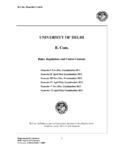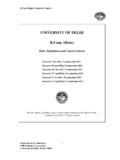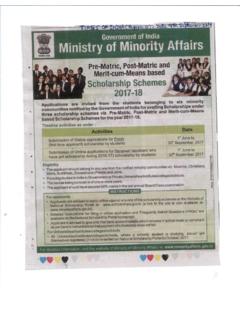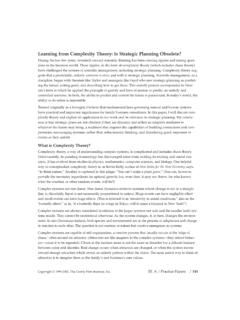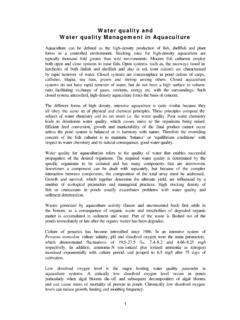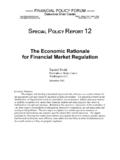Transcription of UNIVERSITY OF DELHI - Commerce DU
1 UNIVERSITY OF DELHI MASTER OF Commerce ( ) Syllabus Syllabus as per revised course structure to be effective from Academic Year 2009-10 and onwards C O N T E N T S Pages I Programme Structure 1 - 3 II Scheme of Examination, Pass Percentage, 4 - 5 Promotion Criteria etc. III Course Contents and Reading Lists of Programme 6 - 83 IV Comparative Statement of Existing and 84 - 86 Revised Programme 1 I : Programme Structure AFFILIATION The programme shall be governed by the Department of Commerce , Faculty of Commerce and Business, UNIVERSITY of DELHI , DELHI 110007 Programme Structure The Programme is divided into two parts as under.
2 Each Part will consist of two Semesters. Semester Semester Part - I First Year Semester I Semester II Part II Second Year Semester III Semester IV The schedule of papers prescribed for various semesters shall be as follows; Papers Marks Total Marks Dura tion (Hrs.) Credit (Hrs.) Written Internal Assmnt. Part I : Semester I Paper 6101 : Organisation Theory and Behaviour 70 30 100 3 4 Paper 6102 : Statistical Analysis 70 30 100 3 4 Paper 6103 : Economic Analysis 70 30 100 3 4 Paper 6104 : Financial Management and Policy 70 30 100 3 4 Total 400 16 Part I : Semester II Paper 6201 : Managerial Accounting 70 30 100 3 4 Paper 6202 : Business Environment 70 30 100 3 4 Paper 6203 : Quantitative Techniques for Business Decisions 70 30 100 3 4 Paper 6204 : Marketing Management 70 30 100 3 4 Total 400 16 Note.
3 In place of one of the compulsory papers mentioned above (namely paper 6201, 6202, 6203 and 204) for this semester, the student may opt for any one of the interdisciplinary courses specified in the syllabus. Part II : Semester III Paper 6301 : Strategic Management 70 30 100 3 4 Paper 6302 : Accounting Theory and Practice 70 30 100 3 4 Paper ---- : Elective I (Paper 1) 70 30 100 3 4 Paper ---- : Elective II (Paper 1) 70 30 100 3 4 Total 400 16 Part II : Semester IV Paper 6401 : International Business 70 30 100 3 4 Paper 6402 : Human Resource Management 70 30 100 3 4 Paper ---- : Elective I (Paper 2) 70 30 100 3 4 Paper ---- : Elective II (Paper 2) 70 30 100 3 4 Total 400 16 Note : In place of one of the two compulsory papers (namely Paper 6401 and Paper 6402), the student may opt for any one of the interdisciplinary courses specified in the syllabus.
4 Grand Total 1600 64 2 Elective Groups: Any two groups from the available electives to be selected at the commencement of M. Com. Part II - Semester III. Notes: 1. The elective groups in the Semester IV will remain the same as the ones selected in Semester III. 2. Once a group has been selected, no change in selected groups will be allowed later. 3. While the first paper of each of the selected groups will be taught in Semester III, the second paper of each of the selected groups will be taught in Semester IV. List of Elective Groups The Department will announce in the beginning of the respective semester, the list of elective groups which will be offered during the semester depending upon the faculty members and the demand of electives.
5 Group A: Finance I Paper 7101 Financial Market and Institutions Paper 7102 Security Analysis and Portfolio Management Group B: Finance - II Paper 7111 Project Management and Financial Services Paper 7112 International Financial Management Group C: Marketing - I Paper 7121 International Marketing Paper 7122 Marketing Research Group D: Marketing - II Paper 7131 Advertising and Sales Management Paper 7132 Consumer Behaviour Group E: Taxation Management Paper 7141 Corporate Tax Planning Paper 7142 Principles and Practice of Taxation and Indian Tax System Group F: Corporate and Industrial Laws Paper 7151 Corporate Law Paper 7152 Industrial Law Group G: Human Resource Management - I Paper 7161 Human Resource Development Paper 7162 Training and Development Group H: Human Resource Management II Paper 7171 Industrial Relations Paper 7172 Management of Transformation 3 Group I: International Business Paper 7181 India s Foreign Trade and Investment Paper 7182 Management of International Business Operations Group J: Accounting Paper 7191 Management Control and Information System Paper 7192 International Accounting Group K: Applied Economics Paper 7201 Industrial Economics Paper 7202 Applied Econometrics Group L.
6 Computer Application and Information Technology Paper 7211 Computer Applications in Business Paper 7212 E- Commerce Group M: Insurance Paper 7221 Insurance Management Paper 7222 Actuarial Practice Interdisciplinary Course Interdisciplinary Paper A (Part I: Semester II) Interdisciplinary Paper B (Part II: Semester IV) The list of specific interdisciplinary papers will be announced at the commencement of the academic session. 5 DIVISION CRITERIA Successful candidates will be classified on the basis of the combined results of Part-I and Part-II examinations as follows: Candidates securing 60% and above : I Division Candidates securing 50% and above, up to 60% : II Division Candidates securing 40% and above, up to 50% : III Division SPAN PERIOD No student shall be admitted as a candidate for the examination for any of the Parts/Semesters after the lapse of four years from the date of admission to the Part-I/Semester-I of the M.
7 Com. Programme. ATTENDANCE REQUIREMENT The students are required to attend tutorials, seminars etc, arranged by the Department/ College from time to time. The minimum percentage of attendance required will be notified by the Department at the commencement of the session. 6 III : COURSE CONTENTS AND READING LISTS OF PROGRAMME Course 6101: ORGANIZATIONAL THEORY AND BEHAVIOUR Time: 3 Hrs. Max. Marks: 100 Objective: The objective of the course is to develop a theoretical understanding among students about the structure and behaviour of organization as it develops over time. The course will also make them capable of realizing the competitiveness for firms. Course Outline: 1.
8 Organizational Theories and Behaviour: Classical, Neo-classical and Contemporary. Authority, Power, status, formal and informal structure. Flat and Tall structures. Bureaucratization of organisations. Organisational Behaviour-concepts, determinants, models, challenges and opportunities of OB. Transaction cost and organizational behaviours Contributing disciplines to the OB. Individual Behaviour: Foundations of individual behaviour, values, attitudes, personality and emotions. Theory X and Theory Y, Chris Argyris behaviour patterns, Perceptual process. 2. Group Decision making and Communication: Concept and nature of decision making process, Individual versus group decision making, Nominal group technique and Delphi technique, models of communication, communication effectiveness in organizations.
9 Feedback, TA, Johari Window. 3. Motivation: Need hierarchy, Maslow s Need Hierarchy, Two factor theory, Contemporary theories of motivation (ERG, Cognitive evaluation, goal setting, equity) expectancy model. Behavior modification, Motivation and organisational effectiveness. 4. Leadership, Power and Conflict: Concept and theories, Behavioral approach, Situational approach, Leadership effectiveness, Contemporary issues in leadership. Power and conflict. Bases of Power, power tactics, sources of conflict patterns, levels and conflict resolution strategies. 5. Organisational Culture, Organisational Development and Stress Management: Concept and determinants of organisational culture, Organisational Development: concept and intervention techniques.
10 Individual and organisational factors to stress, consequences of stress on individual and organisation, management of stress. 6. Case Studies: Some cases of real business world are required to be discussed. Suggested Readings: 1. Robbins; , Organisational Behaviour (13th edition), Prentice Hall of India Pvt. Ltd., New DELHI , 2008. 2. Luthans, Fred, Organisational Behaviour, 11th Edition, Mc Graw Hill International, New York, 2007. 3. Robins , Organisational Theory: Structure Design and Application, 3rd ed., Prentice Hall of India Pvt. Ltd., 2007. 7 Course 6102 : STATISTICAL ANALYSIS Time: 3 Hrs. Max. Marks: 100 Objective: The objective of the course is to acquaint students with some of the important statistical techniques for managerial decision making.
